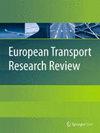Urban (UMaaS) and rural (RMaaS) mobility as a service (MaaS): practical insights from international practitioners and experts
IF 4.2
3区 工程技术
Q1 TRANSPORTATION
引用次数: 0
Abstract
The concept and potential of Mobility as a Service (MaaS) has been the subject of significant debate in academia and industry for nearly a decade. There are several city-based Mobility as a Service (MaaS) pilots globally. There remains a significant lack of practitioner evidence of MaaS with the focus on city-based solutions rather than in rural and suburban areas. To that end, this paper asks four research questions to contribute to the gap in Rural MaaS (RMaaS) and Urban MaaS (UMaaS); firstly, is MaaS a mobility option for rural areas given the identified evidence in scientific literature? Secondly, how do practitioner experiences with MaaS (in all areas) differ considering factors like phraseology, geography, available modes, transportation, the origin and implementation stages? Thirdly, what practical learnings can be drawn from practitioners in the field? Fourthly, what is the future of MaaS for rural and urban areas. The research and findings are based upon grey literature and twenty semi-structured interviews with representatives from research or government organisations, public bodies, MaaS technology suppliers, transport operators and experts. Each participant discussed and contributed to the practicalities around real-world applications of MaaS in urban, regional, or rural areas. The analysis produced 2 applied tools which will be useful to practitioners interested in MaaS; a Thematic Map visualising the common matters emerging from the interviews revolving around ‘People, Policy, Practice and Pilots (4Ps); a Practical Framework for Implementing MaaS tool, which can be used by any practitioner at any stage of a MaaS project.城市(UMaaS)和农村(RMaaS)移动即服务(MaaS):国际从业者和专家的实践见解
近十年来,"移动即服务"(MaaS)的概念和潜力一直是学术界和产业界热议的话题。全球有几个以城市为基础的移动即服务(MaaS)试点项目。但在以城市为基础的解决方案方面,而不是在农村和郊区,仍然严重缺乏有关移动即服务的实践证据。为此,本文提出了四个研究问题,以弥补农村移动即服务(RMaaS)和城市移动即服务(UMaaS)方面的不足;首先,鉴于科学文献中已确定的证据,移动即服务是否是农村地区的移动选择?其次,考虑到措辞、地理、可用模式、交通、起源和实施阶段等因素,(所有地区的)实践者在使用 MaaS 方面的经验有何不同?第三,从该领域的从业者身上可以汲取哪些实用经验?第四,MaaS 在农村和城市地区的前景如何?研究和结论基于灰色文献和 20 个半结构式访谈,访谈对象包括研究或政府组织、公共机构、MaaS 技术供应商、交通运营商和专家代表。每位参与者都围绕 MaaS 在城市、区域或农村地区的实际应用进行了讨论,并提出了自己的看法。分析结果产生了两个对 MaaS 有兴趣的从业人员非常有用的应用工具:一个主题地图,可视化访谈中围绕 "人员、政策、实践和试点(4Ps)"出现的共同问题;一个实施 MaaS 工具的实用框架,可供任何从业人员在 MaaS 项目的任何阶段使用。
本文章由计算机程序翻译,如有差异,请以英文原文为准。
求助全文
约1分钟内获得全文
求助全文
来源期刊

European Transport Research Review
Engineering-Mechanical Engineering
CiteScore
8.60
自引率
4.70%
发文量
49
审稿时长
13 weeks
期刊介绍:
European Transport Research Review (ETRR) is a peer-reviewed open access journal publishing original high-quality scholarly research and developments in areas related to transportation science, technologies, policy and practice. Established in 2008 by the European Conference of Transport Research Institutes (ECTRI), the Journal provides researchers and practitioners around the world with an authoritative forum for the dissemination and critical discussion of new ideas and methodologies that originate in, or are of special interest to, the European transport research community. The journal is unique in its field, as it covers all modes of transport and addresses both the engineering and the social science perspective, offering a truly multidisciplinary platform for researchers, practitioners, engineers and policymakers. ETRR is aimed at a readership including researchers, practitioners in the design and operation of transportation systems, and policymakers at the international, national, regional and local levels.
 求助内容:
求助内容: 应助结果提醒方式:
应助结果提醒方式:


